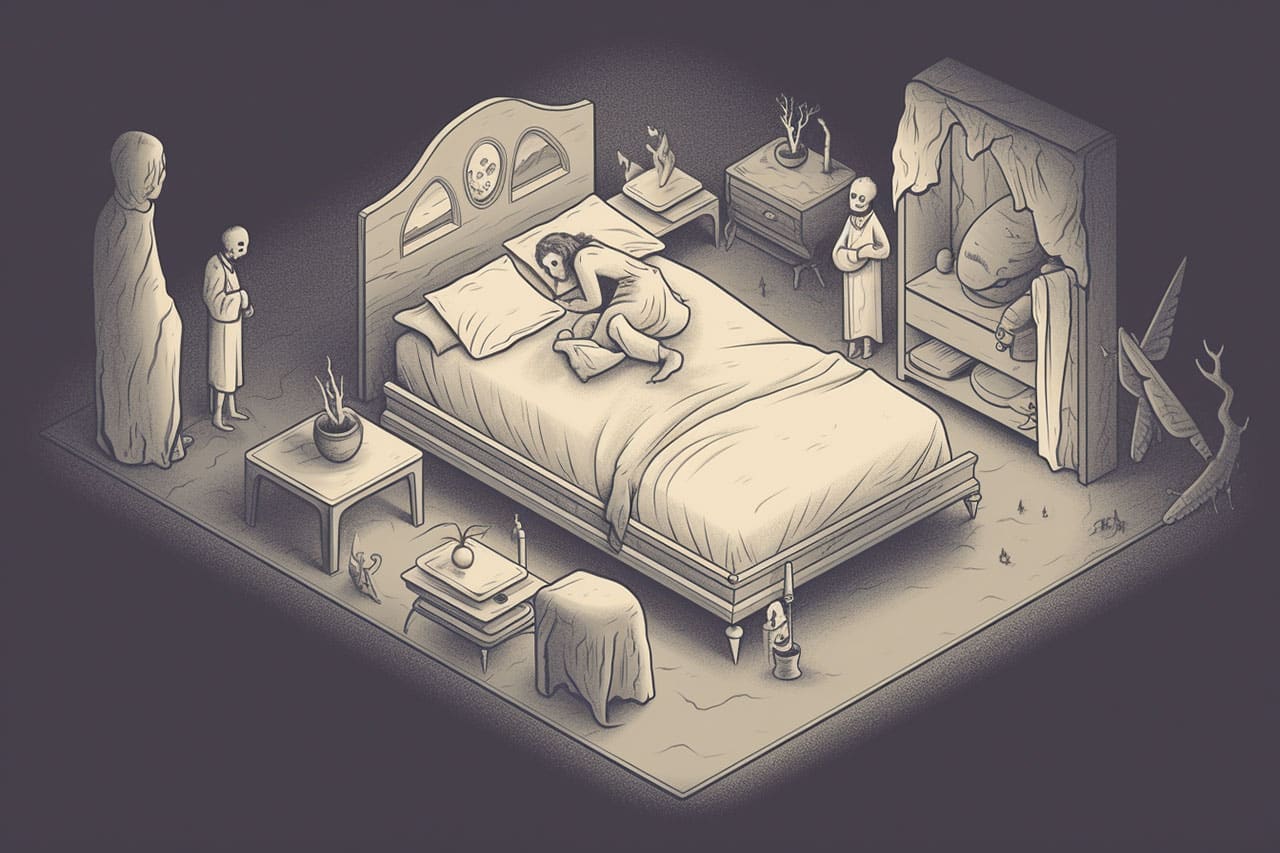Nightmares. We’ve all experienced them at some point in our lives. Those vivid, unsettling dreams that leave us waking up in a cold sweat, our hearts pounding in our chests. They can be terrifying, haunting, and linger in our minds long after we’ve opened our eyes to the real world. But what exactly causes nightmares? Why do they occur, and what do they reveal about our innermost fears and anxieties? In this article, we will delve into the fascinating realm of nightmares, exploring their causes and shedding light on the significance they hold in our lives.
The Dark Side of Dreaming
Nightmares are intense, disturbing dreams that provoke a strong emotional response, often accompanied by feelings of fear, terror, or anxiety. Unlike regular dreams, which can be whimsical, nonsensical, or even pleasant, nightmares jolt us awake, leaving us feeling unsettled and shaken. The content of nightmares can vary widely, ranging from common themes like being chased or attacked, to more surreal scenarios that defy logic and reason. Regardless of the specific imagery, nightmares are universally unsettling experiences.
Nightmares and the Unconscious Mind
One theory suggests that nightmares serve as a window into our unconscious minds, providing a glimpse into our deepest fears and unresolved conflicts. These dreams act as a channel for our minds to process and confront emotions or traumatic experiences that we may have pushed aside or repressed. Nightmares, in this sense, can be seen as a form of psychological release, allowing our minds to grapple with unresolved issues that may be affecting our waking lives.
Exploring the Causes
Nightmares can have multiple causes, both psychological and physiological. Stress and anxiety are frequent triggers, as they can disrupt our normal sleep patterns and lead to more frequent and intense nightmares. Traumatic events, such as accidents, abuse, or witnessing violence, can also manifest in nightmares as our minds attempt to process the associated emotions and memories.
Sleep disorders, such as sleep apnea or insomnia, can contribute to the occurrence of nightmares. These conditions disrupt the sleep cycle, causing fragmented sleep and increasing the likelihood of vivid dreams and nightmares. Medications, particularly those that affect the central nervous system, may also influence dream content and contribute to nightmare occurrences.
Emotional Regulation and Nightmares
One function of nightmares may be related to emotional regulation. Dreams, including nightmares, can serve as a way for our minds to process and regulate intense emotions. By experiencing and confronting our fears within the safe confines of the dream world, we may develop better emotional coping mechanisms in our waking lives. Nightmares can provide a platform for desensitization, helping us gradually become less reactive to fearful stimuli.
Nightmares as Symbols
Nightmares often contain vivid symbols and imagery that hold personal significance. These symbols can serve as powerful metaphors, representing deeper emotional or psychological states. Analyzing the symbolism within nightmares can be a valuable tool for self-reflection and personal growth. Keeping a dream journal and exploring the recurring themes and symbols in nightmares can provide valuable insights into our subconscious fears and desires.
Managing and Overcoming Nightmares
For those who suffer from frequent nightmares, finding ways to manage and overcome them can significantly improve their quality of life. Various techniques have proven helpful, such as implementing relaxation and stress reduction techniques before bedtime, creating a calm sleep environment, and establishing a regular sleep routine. Additionally, therapy approaches like cognitive-behavioral therapy for insomnia (CBT-I) and image rehearsal therapy (IRT) can assist in reducing nightmare frequency and intensity.
Conclusion
While nightmares can be distressing, they offer a unique portal into our inner worlds. Exploring the causes and symbolism behind nightmares can lead to a deeper understanding of ourselves and provide opportunities for personal growth and healing. By acknowledging and addressing the underlying emotions and experiences that contribute to nightmares, we can work towards resolving inner conflicts and achieving better emotional well-being.
It is important to remember that nightmares are a normal part of the dreaming experience and that occasional occurrences are generally not cause for concern. However, if nightmares become persistent and significantly disrupt daily life or sleep quality, it may be beneficial to seek professional help from a qualified therapist or sleep specialist. They can provide guidance, support, and specific interventions tailored to individual needs.
In our journey through the realm of nightmares, let us embrace these unsettling dreams as catalysts for self-exploration and growth. By shining a light on our fears, anxieties, and unresolved emotions, we can navigate the dark corridors of our subconscious and emerge with a greater understanding of ourselves. Nightmares may be formidable, but with courage and introspection, we can transform them into valuable stepping stones on our path to self-discovery.
